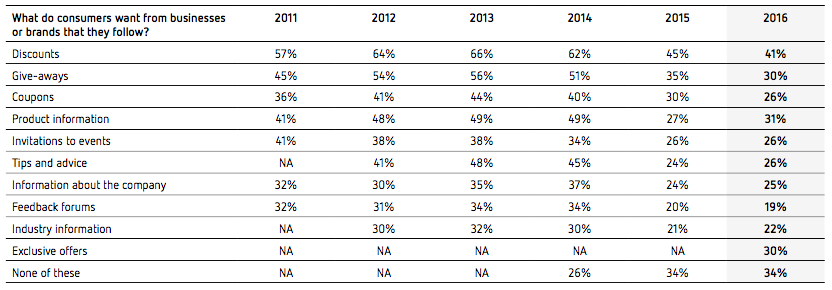The annual Sensis Social Media Report has been published for 2016 and we’re keen to share the most interesting insights from the 800 consumers, 1,000 SMBs and 100 large businesses surveyed in Australia on their social media habits – in the least statistically boring way possible.
1. Most popular platform
Relax your eyebrows for this one. You guessed it – Facebook. It’s up from 93% to 95% since last year’s report, followed by Instagram, also up from 26% to 31%. The average Facebook user now exceeds 12.5 hours per week scrolling feeds and interacting with friends and brands, increased from 8.5 hours per week last year. Where everyone pulled an extra 4 hours from each week is anybody’s guess, but it goes to show the big blue giant is showing no signs of weakening and as a society we’re devoting more time to our virtual lives.

2. On the loo
Come on, admit it. You check Facebook on the toilet. Well, if you’re in the 19% of people surveyed between the ages of 18 and 29, we have it on good authority that you do. If you’re in this age bracket you also have the most friends on Facebook (averaging 499) and are most likely to check social media while you’re on the job at work (49%). 18-29s are also the heaviest users of social media with 90% getting in on the digital action. How the other 10% spend their 12.5 hours of free time per week, we’ll never know.
3. Addiction
Did we say addiction? Sorry, we meant frequency. 57% of those surveyed access social media every day (or most days) up from 53% last year, and 26% refer to their social bibles upwards of 5 times a day (increased from 24%), which if you’re doing first thing in the morning (up from 45% to 49%), at work (up from 32% to 35%), in the train on the way home (down from 26% to 25%) and before bed every night (down 41% to 35%), is actually pretty easy to do. Not to mention the 8% of people using it between sets at the gym. How else are they supposed to post hot sweaty #selfies?
4. Men vs. women
Women are more likely to use social media in the home, while men are more active on public transport (30% vs 20%) and at the gym (12% vs 5%). They’re also twice as likely to use it on the loo – go figure – and more likely to use it at work (44% vs 26%). All this extra screen time for males could be due to the fact that they have, on average, 103 more friends to engage with than women. Quality over quantity, right ladies?
5. The trust factor
If your business interacts with your clients and followers on social media in a positive way, 52% of prospects are more likely to trust your brand.
52% of consumers also experience increased trust if they find the content you post relevant and engaging, and 51% will trust your business more if you regularly update your feeds. Going a week between posts? You’re leaving it too long.
If you post irrelevant or unappealing content, 52% of people are likely to unfollow your business, so make sure you’re creating social media content your customers crave, and not putting them to sleep with a barrage of posts about how good your products and services are.
Instead, focus on how you can help solve a specific problem your customers face, and remember the golden 80/20 rule: only 20% of your content should promote your brand, while the other 80% should inspire, educate and engage your audience in conversations.
6. Advertising
Over a third of consumers (down 4% since last year) are ok with seeing ads across their social media and more than 4 in 10 users click on ads occasionally to get more info (up by 1% on last year’s stats).
If you’re not experimenting with Facebook ads, you should be. You can set your own geographic and demographic targeting, timeframes and daily budgets. You don’t need to be a big business to buy a small share of the advertising space for testing and measuring – you just need a compelling and relevant offer, an eye-catching image and some grabby headlines to test.
In 2014, 69% of users claimed to take absolutely no notice of ads, however this has dropped to 53%, meaning more people are now paying attention. Most users ignored sponsored posts from businesses they don’t follow (perhaps paying for Facebook likes isn’t just a vanity measure), and a new statement included this year tells us that more than 4 in 10 users will check out a brand’s social media profiles before making an online purchase. This means if your pages are out dated and irrelevant, it could be directly affecting your bottom line!
7. What consumers want
Thanks to Sensis, we don’t have to guess what consumers want on social media. It’s all right here in a handy little table. Above all else, consumers want discounts and give-aways from brands, so think about this in terms of your current strategy.
How often you are doing giveaways (also a great list building tool), or offering your fans exclusive follower-only deals? Could you be doing more of it? The desire for product information is notably high as well, so people are using social media to find out about products and services. But, keeping the 80/20 rule in mind, rather than clogging your Timeline with product prices and features, add it to your Page Info section for quick reference and direct visitors to your website or landing pages for more information.

As Sensis points out, social media is one of the only online mediums where businesses can conduct two-way conversations with their clients, allowing them to gather feedback, monitor market sentiment and build a positive brand culture and personality, all on a conservative small business marketing budget.
The the Sensis 2016 Social Media Report figures can be used to guide your social media marketing, but remember they only represent a sample of Australian consumer habits, and only testing and measuring with reference to your own social media analytics can give you an accurate representation of how your customers (brides) use social media to interact with your brand and inform their buying decisions.

















